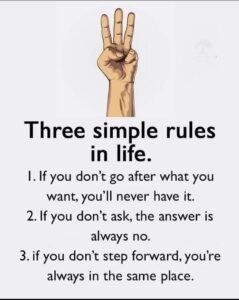Half of being smart is knowing what you are dumb about.Solomon Short
In our own way, each of us would have some competencies that give us the edge over others but that does not necessarily mean that we are smart. When we can recognize our competencies and simultaneously be aware of our deficiencies and work around leveraging the first and plugging the loopholes in our deficiencies, which is when we slowly become smart.
The three rules to be smart are as under:
When in doubt find it out. It is obvious that each of us will have limitations in grasping everything that we try to learn or attempt. Being ignorant is not the problem the problem is remaining ignorant. Hence it is imperative that we first realize our ignorance, find the right way to eliminate that ignorance and then systematically go about erasing that ignorance by learning and implementing the learning. A simple example is our visit to a doctor when we are ill. While we are aware of the symptoms and perhaps have an inkling of the real problem it is the expert in the form of the doctor who will diagnose it correctly and prescribe the right medication. Similarly coaches focus more on ironing out the mistakes made by players both as individuals and as a team. The net result is improved performance all thanks to learning more from those who are entrusted with helping us out.
Talk less listen more. The more we listen the more we can assimilate. This means we are taking in more knowledge and we can then utilize the learning to conceptualize, strategize and execute better. Often in the process of merely talking we give out more than what is needed, do not address the real issue since we haven’t paid attention to the receivers needs and our verbosity can confuse, conflict and camouflage the solutions. Listening also helps build rapport with the speaker, allows us time and inputs to maneuver and offers new avenues and opportunities to explore. When we leverage all this inputs we offer smart solutions.
Learn the trade and only then focus on the tricks of the trade. We are often in a hurry and that means we attempt to execute the tricks of the trade and hope that we can attain our objectives quickly. We also believe that by doing this we come across as smart individuals. With experience and foresight one can take the liberty of trying a few tricks of the trade .However it is always safe to understand the trade in depth before we even attempt a few tricks because if we execute half baked ideas the end result could be catastrophic and could lead to unmitigated losses and even loss of face. E.g Even the most experienced cricket batsman will think twice before attempting the reverse sweep so for a rookie to attempt it could be suicidal.
Remember: Be smart, but never show it. Louis B. Mayer
Try these:
- Learn a couple of card tricks. Then attempt them on your family and friends and see if you can do the tricks smoothly. You will realize initially you may foul up but that the more your practice the better you get and soon you can do those tricks like a pro.
- Try and solve the following if you think you are smart. ( The first question is solved for you to get a feel of how you need to come to the solutions)
- 7 D in a W = 7 Days in a Week
- 1,000 Y makes a M =
- 52 C in a P of C =
- 10 T on your F =
- 5 W & 1 H =
- 3 W on a T =
(Answers will be given in the next post)
This post is courtesy www.actspot.com
You are also invited to visit our WEEKLY Inspirational and Motivational Blog www.poweract.blogspot.com





